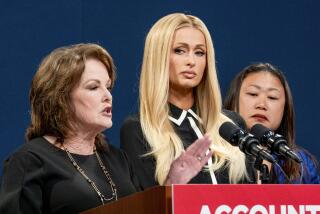Senate OKs Bill to Increase Rights of Dead Stars’ Heirs
SACRAMENTO — Legislation aimed at strengthening the rights of heirs and others to block unauthorized commercial use of the images of dead celebrities won lopsided approval of the state Senate on Monday.
The bill--sponsored by Robyn Astaire, widow of dancer Fred Astaire, and the Screen Actors Guild--went to the Assembly on a 30-1 vote without debate.
Senate President Pro Tem John L. Burton (D-San Francisco) conceded that his bill, SB 209, faces opposition in the Assembly from powerful special interests, but said he will try to reach compromises with them.
“It is a bit of a work in progress,” Burton said of the bill, noting that Nancy Reagan supports it.
Opponents include major studios, movie and television producers, broadcast networks, newspaper publishers and civil libertarians.
The unapproved use of a deceased celebrity’s image for commercial purposes has long been against the law. In 1984, California made protection against such use a property right that, in effect, can be passed on to heirs of famous people.
Robyn Astaire took her case to the Legislature after losing a long legal fight two years ago in the U.S. 9th Circuit Court of Appeals.
She charged that without permission, a video producer used a movie image of her dead husband in a how-to video on “dirty dancing.” She sued, charging that the company made an unauthorized appropriation of her dead husband’s image, which she compared to “the Good Housekeeping Seal of Approval.”
The state law exempts use of celebrity likenesses in certain cases, including films, plays, musical productions, newspapers, books and magazines. In the Astaire case, the court found that use of the movie clip in the video fit the exception for films. The U.S. Supreme Court rejected her appeal.
The Burton bill would abolish the list of exceptions and permit use of celebrity likenesses to the extent allowed by the 1st Amendment’s right of free speech and free press.
One opponent, Universal Studios, has taken the position that “creative expression will be stifled” if writers, artists and producers are “left to guess about whether a reference or portrayal is protected by the 1st Amendment.”
More to Read
Sign up for Essential California
The most important California stories and recommendations in your inbox every morning.
You may occasionally receive promotional content from the Los Angeles Times.










